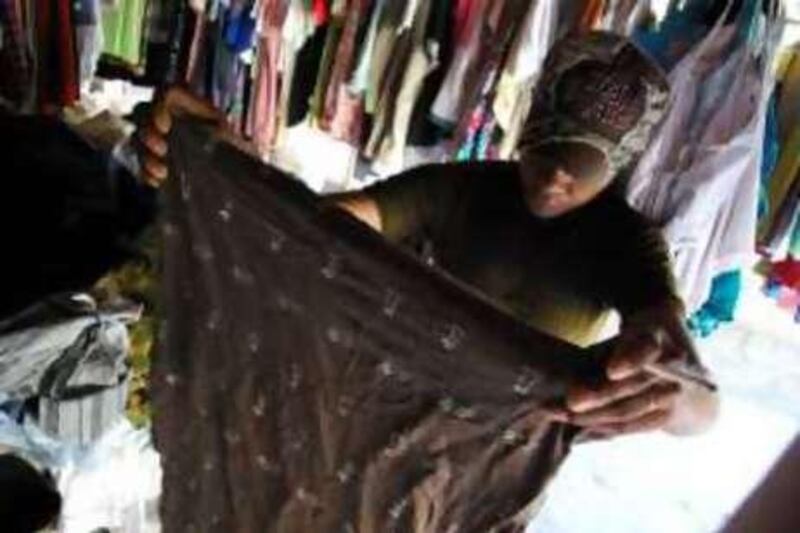Dili // It is no secret that charity clothes cast off from rich countries end up on the backs of some of the poorest people on Earth. But sometimes the best intentions go awry and result in increased poverty in some of the world's developing nations.
East Timor is one of many countries in Asia where donated used clothes have become a profitable business, enabling a single company to dominate the market and keep dozens of vendors mired in poverty. In East Timor, that business is Intelligent Yield Trading, based in the country's capital. The newest country in Asia, East Timor has never had a clothing factory and because of the sale of charity clothing, it may never have one.
Armindo da Silva Soares, 46, is one of a handful of East Timorese tailors in Dili. He learnt his craft after the Indonesian invasion in 1975. "An Indonesian taught me," Mr Soares said. "I paid him US$50 [Dh183] and bought a sewing machine." During the Indonesian occupation, Mr Soares ran a shop with 27 machines and 10 employees. But in 1999, when the Indonesians left East Timor after a vote of self-determination, militias torched about 70 per cent of the tiny nation's infrastructure, including homes, businesses and public and private offices.
In the years following, East Timor has tried to rebuild its private sector, with varying degrees of success, but local tailors say they are worse off than before, thanks mostly to donated clothing from developed countries that is undercutting their sales. In the past decade, Mr Soares's shop, located in what was once one of Dili's largest markets before it was razed in 2006, has been set alight four times, and he has only three machines left. He can no longer afford to pay any employees.
To make matters worse, his attempts to kick-start his business have been thwarted by the emergence of used clothing stalls, selling cheap charity clothing, that have mushroomed around the city since 2006. Several have set up on the same street as Mr Soares, taking most of his potential customers. "The used clothing market is a big worry for us tailors," he said. "Those clothes are so much cheaper. They're all old, but they're cheap."
So far this year, none of Mr Soares's former clients have contacted him. In 2000 Suyanto Tan, an Indonesian entrepreneur, opened Intelligent Yield Trading, a used clothing outlet in Dili. From his cavernous warehouses, bales of used clothes make their way to the markets and stalls of East Timor and even over the border to Indonesian West Timor. At first there was some competition from other outlets, but according to Mr Tan, the last competitor closed in 2003. For five years now, a single company has been providing clothes for more than one million people. And the local tailors are certainly no competition.
Selling used clothes now provides a living for many East Timorese, particularly those who have been left with nothing after the numerous outbreaks of violence since the Indonesian withdrawal in 1999. "I used to sell vegetables and fried snacks, but in 2006 my stall was burnt down," said Felicidade Gusmao, 50, who now has a used clothing stall. "I lost my home and everything I owned." Ms Gusmao sits under the shade of shirts and pants while she waits for customers. She said her family scraped together some cash in 2007 and bought its first bale of used clothes from Intelligent Yield. She said she does not make much money selling clothes, certainly not enough to save - the shirts are $1 each, and the pants only slightly more. But she does make enough to survive and have something left over to make her monthly trip to Intelligent Yield for another bale of clothes.
"I can buy food and pay for what I need," Ms Gusmao said. The bales come in shipping containers, delivered through an agent in Singapore. Intelligent Yield buys one container for about $2,000, which translates to about $18 per bale, which are then sold for around $150 each. When the ship comes in they can sell more than 20 bales in a single day. Singapore acts as the distribution centre for the clothes with garments arriving there from first world countries packaged without any trace of the charity that sent them.
Each month Ms Gusmao hopes the bale she buys will have good clothes inside. Because the bales are packed in the countries of origin, no one - neither the clothing agent in Singapore nor Intelligent Yield in East Timor - knows the quality of the clothes contained within. There are no returns. Often clothes are too big to fit on tiny East Timorese bodies or they are very old. These go in a pile Ms Gusmao dumps at the end of the month in a ditch across the street. When the rains come in a few months, the clothes will wash out to sea.
* The National





